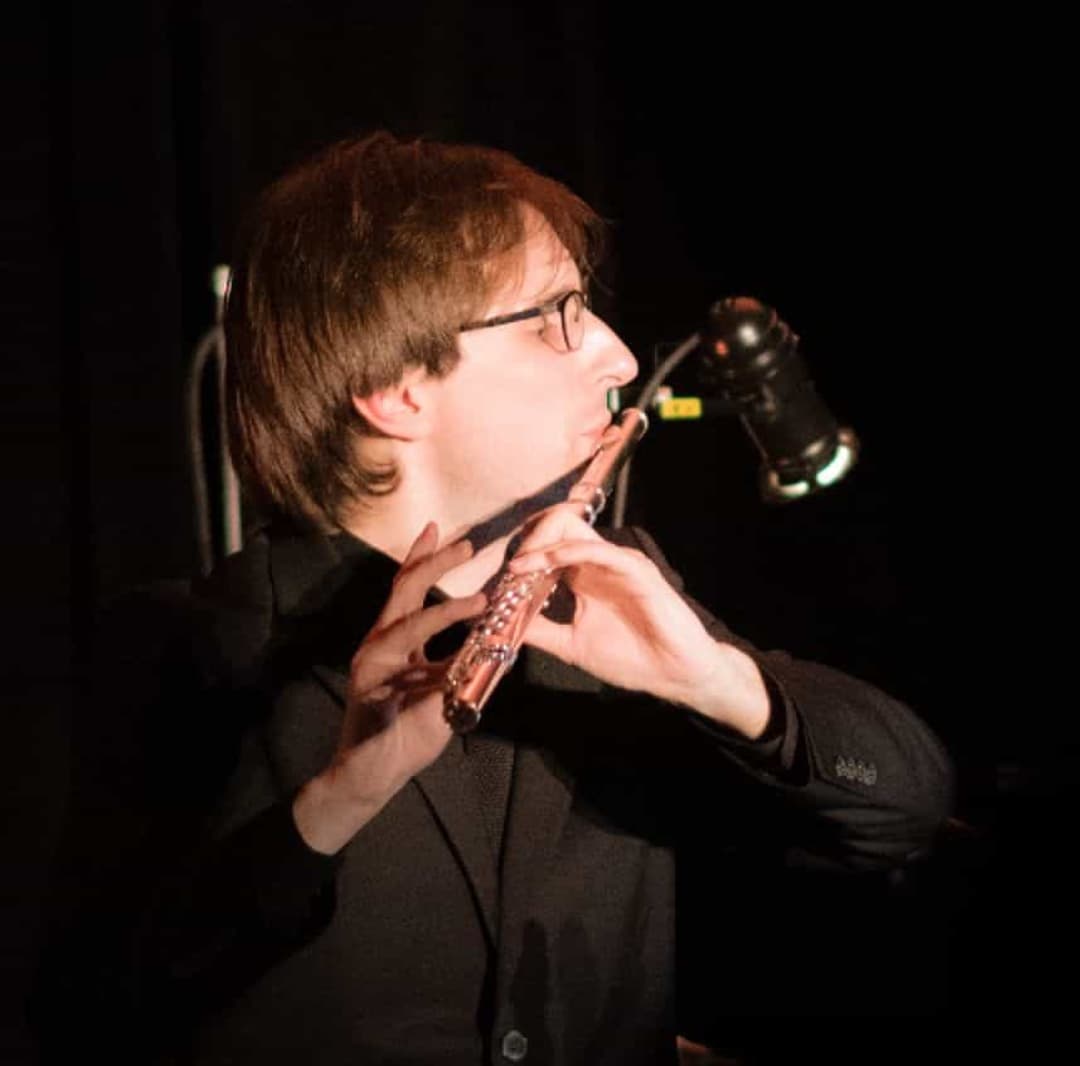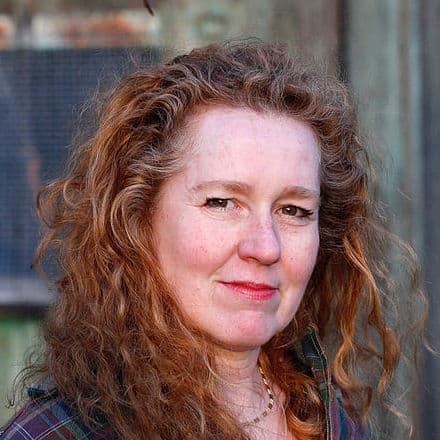
Luciform
Guillermo Laporta, flute
Marieken Cochius, painter
Luciform is part 4 of the “Mansion Cycle” (2009-2011),
and the third work in “Cosmology”, an ongoing series of works for solo performer and electronics.
Luciform is a concerto for flute and electronic music.
Latin lux, lucis (light) + form, "light-form"
Lucifer "light-bearer", "the morning star"
Seeking illumination through transgression of boundaries.
Luciform is a journey inward, a movement through a series of vision states. A difficult path, a rite of passage,
hovering between diabolical intensity and lucid wakefulness.
I had decided on the medium I wanted to work in before listening
to the music.
Since I knew I had to film the creation of the work on paper, I wanted to work with ink and graphite and pastels on wet paper.
I have made series of work with inks before and I love being in the moment of the (ink) flows, reacting quickly to what is happening on the paper.
By working on an angled easel, the ink spreads downwards on the wet paper and thus the work changes while I work on it. I use different
inks; some are shellac-based and their drips grow out into fractal-like shapes or roots. Other inks fade out into the wet paper and become
lighter in color as the paper dries out during the making of the work. And as the paper dries, the ink lays more on top rather than
soaking into the paper. This is a fun process to play with.
I work subconsciously and directly, and I wanted to film it the first time I heard the music, thereby not giving my “ thinking
mind” an opportunity to decide or interfere what I would make.
While creating I found myself focusing on and reacting to the “shape” of the sounds: lengths of breaths and tones translate
in lengths and thicknesses of line, high notes can become different colors or placements on the paper, repetitions in the composition can
invite an echo of shapes, and undercurrents of other instruments or sounds become background or emphasize interruptions of a pattern. Loudness
and fading of notes are trails in thickness and speed of the application of inks and lines. This musical piece is very layered, almost like
a netting.
It seemed to me that the sounds of the flute were moving like antennas mapping out an invisible space. Retracing parts, repeating parts,
and playing against a sometimes barely audible echo. The sparsely used other instruments and sounds in the composition would rise and ebb
forcing the flute to vigorously “weld” its previous lines into solid shapes. The ethereal sound of the flute is also solidly
metallic. Filling the space with sound.
There was an interesting dialogue in my mind about me not being a dancer, moving to music and creating shapes in time with the music.
My hands reacted to the music more like the creating of a sculpture. An exploration of density imbued the work in these different
realms.


Guillermo Laporta is a New York City-based flutist, designer, director, and producer.
He is currently the executive and artistic director of CreArtBox. His work present wide-ranging multidisciplinary
connections between music and other art forms.
His main works as composer and playwright are: the ballet / opera Two Roads (2020), the visual concert Awave (2018),
the play/concert Visuality (2012/14), the opera Noctum (2011) , the musical London The show (2009), and CreArt Project I (2006)
He was co-principal flute of the Oviedo Filarmonia Orchestra from 2009 to 2012 and throughout his career as a flutist he has performed a wide repertoire of symphonic, opera and chamber works, with the BBC Concert Orchestra, Orquesta del Principado de Aturias, Le Train Bleu Ensemble, New York International Orchestra, Orquesta Sinfónica de Euskadi, sharing the stage with renowned musicians such as Sir. Roger Norrington, Andrew Litton, Pablo González, Vladimir Ashkenazy, Truls Mørk, Natalia Gutman, The Labèque sisters, Ainhoa Arteta, Jiri Barta or Heinrich Schiff, in prestigious venues around the world including Carnegie Hall or Lincoln Center.


Marieken Cochius is a Dutch-born artist whose work is meditative and intuitive and often explores growth forms,
movement of light and wind, root systems, and animal architecture. She is drawn to remote places where she studies nature
and makes art inspired by it. Her work encompasses drawing, painting and sculpture. In 2021 Cochius received an NYSCA
Decentralization Grant for an Individual Artist Commission. She is a 2020 recipient of a Foundation for Contemporary Arts (FCA),
Emergency Grants COVID-19 Fund grant. In 2017 Cochius completed a public sculpture commission for the Village of Wappingers Falls,
NY made possible by a grant from the Hudson River Foundation.
Cochius' work has been exhibited in numerous galleries and institutions in places ranging from New York City, NY, Berkeley, CA, Austin, TX,
and Los Angeles, CA, to Japan, Germany and the Netherlands.
She has participated in residencies including the Vermont Studio Center, Johnson, VT. Cochius participated in recent group exhibitions at the
Alexey von Schlippe Gallery at UConn Avery Point, CT; the Attleboro Museum, MA; Foundry Art Centre, St Charles, MO; Woodstock Artist Association
and Museum, Woodstock, NY; Roxbury Arts Center, NY; The Ely Center, New Haven, CT; Ann Street Gallery, Newburgh, NY; Sideshow Gallery, Brooklyn,
NY and more.
Her work was recently featured in the publications Willard and Maple Magazine (cover), Sun Spot Journal (cover), and in Columbia
Journal, Superstition Review, High Shelf Press, Tule Review 2020, Cold Mountain Review, Mud Season Review, Art for a New Earth,
DeLuge Journal, Alluvian Environmental Journal, and Raw Art Review. Cochius studied photography at the Art Academy St Joost in Breda,
the Netherlands. She currently lives in the Hudson Valley, New York.